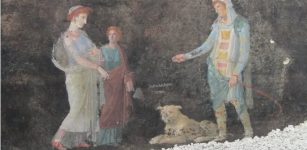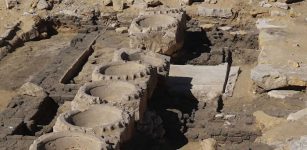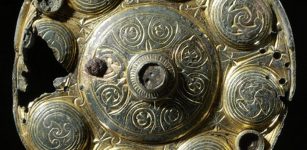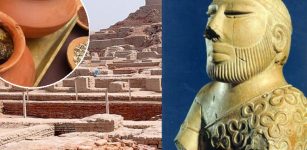Apollo Punished Rivals For Their Extraordinary Musical Skills
A. Sutherland - AncientPages.com - Among the Olympian Gods, Apollo is the most complex figure in all his aspects.
As central to Greek culture, he has been recognized as a god of music and dance, truth and prophecy, art, healing and diseases, the Sun and light, knowledge, poetry, and archery.
Ancient Roman statue of God Apollo playing a lire. Image credit: Adobe Stock - giorgio
He was also the god of the Oracle and the patron saint of the Delphi. Popular among the gods, Apollo was also loved by ordinary people of ancient Greece.
Though renowned in the art of music, it does not mean he had no rivals who considered themselves equal to him in this respect. He had a few individuals who challenged him to compete in a musical contest.
One of them was Marsyas, and another was Pan. Marsyas was a Satyr who had picked up the flute, which the goddess Athena had thrown away in disgust. After being touched by the goddess's lips, he found that the flute played itself most charmingly.
The Satyr, Marsyas, was a great lover of music and much beloved on this account by all the elf-like creatures living in the glens and woods. He was so intoxicated with the sound of the flute and its discovery that he mindlessly challenged Apollo to compete with him in a musical contest.
 Apollo and Marsyas. House of Aion Mosaic, Paphos. Image credit: Mgiganteus - CC BY-SA 3.0
Apollo and Marsyas. House of Aion Mosaic, Paphos. Image credit: Mgiganteus - CC BY-SA 3.0
The challenge was accepted, and the Muses were chosen referees. It was also decided that the unsuccessful competitor should suffer the cruel punishment of being flayed alive.
For a long time, the merits of both claimants remained so equally balanced that it was impossible to award the palm of victory to either. Finally, Apollo was the one who resolved to conquer by adding the sweet tones of his melodious voice to the strains of his magical lyre.
The result was that he won the competition, but would he win the contest without engaging his incredible voice in his performance?
Marsyas was defeated and very sad. He suddenly realized that he must undergo the terrible penalty of dying in torture. 'Apollo took the cruelest revenge on Marsyas: flaying him alive and nailing his skin to a pine (or a planetree). A legend says that many of Marsyas' companions cried, including the Satyrs and Dryads. Unhappy at his terrible fate, they had gathered all their tears together and created a river in Phrygia, which is still known today by the name of Marsyas.
Pan, the god of shepherds, declared that he could play even more skillfully on his flute of seven reeds than the god Apollo on his lyre. This contest, widely known among the Olympians, also had another competitor. After challenging Apollo, this competitor survived unharmed, but the third rival to Apollo's extraordinary musical skills was Cinyras, king of Cyprus and a great flutist.
Apollo and King Midas. Painting by Simon Floquet, circa 1634.Photographer: Sotheby's – Public Domain
Tradition has it that Cinyras was revered as the creator of art and musical instruments, especially the flute. In one source, he is also mentioned for his physical beauty. The legend says that the king of Cyprus was also an excellent singer, and he posed a musical challenge to Apollo and tested his abilities.
Fate, unfortunately, was not kind to him. His life ended dramatically as the god Mars, who in Greek was the mythological world is identified with the god Ares took Cinyras’ life.
This intriguing contest proceeded, and when it finished, Apollo was pronounced the winner by the all involved judges.
However, Midas, king of Phrygia, disagreed with the judges' decision. He was the only judge who thought that Marsyas was a better player.
Perhaps he had the bad taste to prefer the rather vulgar and primitive tones of the Pan's pipe to Apollo's lyre's enhanced and sweet melodies. Midas, the only judge in the contest, was punished due to his most unusual attitude toward the music of Apollo. Judging him as a stupid man who lacked human ears for music, Apollo gave him the ears of an ass.
Horrified at being disfigured, the Phrygian king had to act quickly to disguise his appearance and disgrace, so he used a Phrygian cap, turban, or another headdress. It was also important that his private barber could keep this most painful secret forever.
Therefore, the man was bribed with gifts of great value, never to reveal the king's secret. Finding that he could not keep the secret any longer, he went out into a meadow, dug a hole in the ground, whispered the story into it:
“‘King Midas has ass’s ears!’ Then he filled up the hole, and went away, at peace with himself until a reed sprouted from the bank and whispered the secret to all who passed. When Midas learned that his disgrace had become public knowledge, he condemned the barber to death, drank bull’s blood, and perished miserably.” 1
Later, a thick bed of reeds sprang up from the covered-up hole and began whispering the story, saying, "King Midas has an ass's ears."
Some sources said that Midas killed himself by drinking the blood of an ox.
Written by – A. Sutherland - AncientPages.com Senior Staff Writer
Copyright © AncientPages.com All rights reserved. This material may not be published, broadcast, rewritten or redistributed in whole or part without the express written permission of AncientPages.com
Expand for referencesReferences:
- Graves, R. The Greek Myths
Walsh, Nicos. Greek Mythology
Fritz Graf, Apollo
More From Ancient Pages
-
 Four Canopic Jars Dated To The 26th Dynasty Unearthed At South Asasif Necropolis, Luxor
Archaeology | Jun 27, 2018
Four Canopic Jars Dated To The 26th Dynasty Unearthed At South Asasif Necropolis, Luxor
Archaeology | Jun 27, 2018 -
 Amazing New Frescoes With Mythological Individuals Discovered At Pompeii
Archaeology | Apr 11, 2024
Amazing New Frescoes With Mythological Individuals Discovered At Pompeii
Archaeology | Apr 11, 2024 -
 Ancient Burials Of World’s First Horse Riders Found Near The Black Sea
Archaeology | Mar 3, 2023
Ancient Burials Of World’s First Horse Riders Found Near The Black Sea
Archaeology | Mar 3, 2023 -
 Cedar – Sacred Tree With Medicine Power In Native American Beliefs
Featured Stories | Aug 26, 2024
Cedar – Sacred Tree With Medicine Power In Native American Beliefs
Featured Stories | Aug 26, 2024 -
 Mysterious Ancient Stone Structures Discovered In Illinois Remain Unexplained – Archaeologists Say
Featured Stories | May 26, 2024
Mysterious Ancient Stone Structures Discovered In Illinois Remain Unexplained – Archaeologists Say
Featured Stories | May 26, 2024 -
 Curious Encounter Between Inuit And Vikings Led To Something Surprising That Shaped History
Featured Stories | Aug 4, 2024
Curious Encounter Between Inuit And Vikings Led To Something Surprising That Shaped History
Featured Stories | Aug 4, 2024 -
 3,000 Years Ago Human Activity Destroyed Vegetation And Irreparably Damaged The Timna Valley Environment
Archaeology | Sep 23, 2022
3,000 Years Ago Human Activity Destroyed Vegetation And Irreparably Damaged The Timna Valley Environment
Archaeology | Sep 23, 2022 -
 King Khufu’s 4,600-Year-Old Solar Boat Has Been Transported To The Grand Egyptian Museum
Archaeology | Aug 9, 2021
King Khufu’s 4,600-Year-Old Solar Boat Has Been Transported To The Grand Egyptian Museum
Archaeology | Aug 9, 2021 -
 Dangerous Magnetic Anomaly And Unexplained Events In Mysterious And Dark Valley Trouble Scientists – Why Must The Stone Gate Not Be Crossed?
Featured Stories | Nov 7, 2024
Dangerous Magnetic Anomaly And Unexplained Events In Mysterious And Dark Valley Trouble Scientists – Why Must The Stone Gate Not Be Crossed?
Featured Stories | Nov 7, 2024 -
 Imhotep: Ancient Genius And Architect Of The Sakkara Pyramid
Featured Stories | Mar 7, 2016
Imhotep: Ancient Genius And Architect Of The Sakkara Pyramid
Featured Stories | Mar 7, 2016 -
 4,500-Year-Old Lost ‘Sun Temple’ Dedicated To God Ra Unearthed In Abu Gorab Necropolis
Archaeology | Aug 4, 2022
4,500-Year-Old Lost ‘Sun Temple’ Dedicated To God Ra Unearthed In Abu Gorab Necropolis
Archaeology | Aug 4, 2022 -
 Petroglyphs Hold Secrets To 14,000 Years Of Human Life In Iran
Archaeology | Apr 30, 2020
Petroglyphs Hold Secrets To 14,000 Years Of Human Life In Iran
Archaeology | Apr 30, 2020 -
 Viking Children Were Buried With Extremely Sharp Knives – Afterlife Tools To Be Used In Valhalla?
Ancient History Facts | Nov 29, 2017
Viking Children Were Buried With Extremely Sharp Knives – Afterlife Tools To Be Used In Valhalla?
Ancient History Facts | Nov 29, 2017 -
 Skidi Pawnee Indians: One Of The Most Proficient Astronomers Of Ancient Times And Their Sophisticated Star Chart
Featured Stories | Nov 28, 2024
Skidi Pawnee Indians: One Of The Most Proficient Astronomers Of Ancient Times And Their Sophisticated Star Chart
Featured Stories | Nov 28, 2024 -
 Scientists In Antarctica Encounter Something Very Strange
Featured Stories | Mar 9, 2020
Scientists In Antarctica Encounter Something Very Strange
Featured Stories | Mar 9, 2020 -
 Manco Capac: Legendary Founder Of The Inca Dynasty Of Peru
Featured Stories | Jun 19, 2016
Manco Capac: Legendary Founder Of The Inca Dynasty Of Peru
Featured Stories | Jun 19, 2016 -
 Remarkable Ancient High-Tech Genetic Disc Could Re-Write Ancient History
Artifacts | Sep 15, 2014
Remarkable Ancient High-Tech Genetic Disc Could Re-Write Ancient History
Artifacts | Sep 15, 2014 -
 Viking’s Symbols Of Travels Prestige And Adventure Were Imported From Abroad
Ancient Symbols | Oct 1, 2015
Viking’s Symbols Of Travels Prestige And Adventure Were Imported From Abroad
Ancient Symbols | Oct 1, 2015 -
 Dazzling Time Capsule Of Unique Iron Age Artifacts And Celtic Roundhouses Discovered In England
Archaeology | Mar 15, 2022
Dazzling Time Capsule Of Unique Iron Age Artifacts And Celtic Roundhouses Discovered In England
Archaeology | Mar 15, 2022 -
 Cooking In Indus Valley – Leftovers In Prehistoric Kitchen’s Vessels Analyzed
Archaeology | Mar 24, 2022
Cooking In Indus Valley – Leftovers In Prehistoric Kitchen’s Vessels Analyzed
Archaeology | Mar 24, 2022


